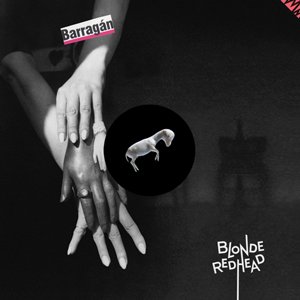“Barragán” by Blonde Redhead

 Despite almost 20 years of making records, Blonde Redhead have never had that breakthrough album that moved them into the upper echelon of American indie bands. They came close with 2007’s 23, their most critically and commercially acclaimed album, which managed to briefly crack the Billboard Albums Chart at #60. One could say Blonde Redhead’s relative lack of notoriety may be due to not being from a major scene, arriving over five years after Sonic Youth and My Bloody Valentine—Redhead’s most obvious influences—had their respective heyday. Their string of albums released in the mid to late nineties sound very little like their indie contemporaries of the day—not as diverse as Slint or Tortoise, and not as rooted in guitar rock as Pavement, Yo La Tengo or Built to Spill. It seemed the band was destined for a life of moderate obscurity.
Despite almost 20 years of making records, Blonde Redhead have never had that breakthrough album that moved them into the upper echelon of American indie bands. They came close with 2007’s 23, their most critically and commercially acclaimed album, which managed to briefly crack the Billboard Albums Chart at #60. One could say Blonde Redhead’s relative lack of notoriety may be due to not being from a major scene, arriving over five years after Sonic Youth and My Bloody Valentine—Redhead’s most obvious influences—had their respective heyday. Their string of albums released in the mid to late nineties sound very little like their indie contemporaries of the day—not as diverse as Slint or Tortoise, and not as rooted in guitar rock as Pavement, Yo La Tengo or Built to Spill. It seemed the band was destined for a life of moderate obscurity.
Nevertheless, Blonde Redhead are set to release their ninth album, entitled Barragán, this month on Kobalt Records. The Sonic Youth-isms of Blonde Redhead’s early career are nowhere to be found, instead embracing the sound of their former label’s 1980s proto-shoegaze darlings. The band wears their former 4AD brethren Cocteau Twins and Pale Saints influences on their sleeves, with dreamy, downbeat melodies and pleasant enough atmospherics—but the group struggles mightily to bring any life to their ideas. Barragán’s songs seem to drift aimlessly from one lifeless loop to the next, eschewing verses and choruses in favor of skeletal drone and monotony. The production is dull, lacking any and all of the richly textured 23’s finer orchestral-shoegaze qualities. The performances are about the same. The band appears content to let half-spun melodies drift into an abyss of digital reverb and delay while Simon Pace’s usually impressive drumming sounds entirely uninterested in adding to the proceedings. The group tries at times to establish a krautrock motorik groove which, on paper, could suit the minimalist dream-pop material well. But the rhythms aren’t given enough time to establish themselves to drive Barragán’s minimalism into the hypnotic.
There isn’t anything particularly offensive about the album, but it’s in its apparent lack of interest in engaging the listener where Barragán’s true problem lies. Only on the icy, electro groove of “Droppings” can one find a pulse. Perhaps what makes Barragán most frustrating is that it sounds like the work of a band that just doesn’t care anymore. Let’s hope that Kazu Makino and the Pace brothers find a reason to care again before their next release. »
– Casey Hardmeyer




